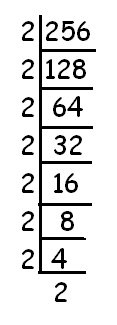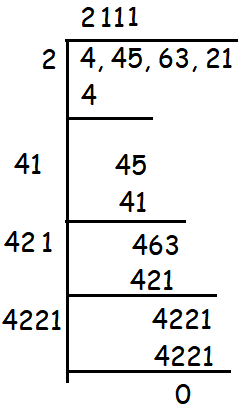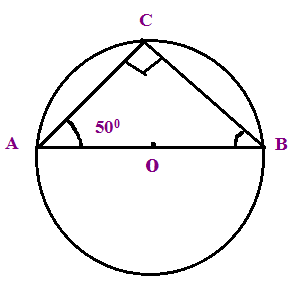8TH GRADE MATH PROBLEMS WITH ANSWERS
Subscribe to our ▶️ YouTube channel 🔴 for the latest videos, updates, and tips.
Question 1 :
What is the smallest number by which 256 may be divided so that the quotient is perfect cube?
(A) 2 (B) 3 (C) 4
Solution :
To find the number required to divide 256 such that the quotient is a perfect cube, we have to decompose 256 into prime factors.
|
= ∛256 = ∛(2⋅2⋅2⋅2⋅2⋅2⋅2⋅2) When we group the prime factors inside the cube root as triples, we left over with 2⋅2. That is 4. Hence 4 is the smallest number required to divide 256 so that the quotient is a perfect cube. |
 |
Question 2 :
How many digits are there in the square root of 4456321?
(A) 2 digits (B) 4 digits (C) 3 digits
Solution :
Square root of 1 digit and 2 digit number contains 1 digit.
Square root of 3 and 4 digit number contains 2 digits.
Square root of 5 and 6 digit number contains 3 digits.
Square root of 7 and 8 digit number contains 4 digits.

So, the square root of the given number has 4 digits.
Question 3 :
Find the value of 3x3 + 4x2 + x - 5 when x = -3.
(A) -53 (B) -71 (C) -32
Solution :
Let f(x) = 3x3 + 4x2 + x - 5.
Substitute x = -3.
f(-3) = 3(-3)3 + 4(-3)2 + (-3) - 5
= 3(-27) + 4(9) - 3 - 5
= -81 + 36 - 3 - 5
= -53
Question 4 :
The perimeter of a rectangle is 52 cm. If its width is 2 cm more than one-third of its length, find the dimensions of the rectangle.
(A) 12 cm and 4 cm
(B) 18 cm and 8 cm
(C) 15 cm and 9 cm
Solution :
Perimeter of a rectangle = 52 cm.
2(length + width) = 52 ==> l + w = 26
Let x be the length. The, width = x/3 + 2.
x + (x/3) + 2 = 26
[(3x + x)/3] +2 = 26
4x/3 = 24
4x = 72
x = 18
Width = 18/3 + 2
= 6 + 2
= 8 cm
So, the required dimensions are 18 cm and 8 cm.
Question 5 :
What must be added to each of the numerator and the denominator of the fraction 7/11 to make it equal to 3/4.
(A) 9 (B) 5 (C) 12
Solution :
Let x be the required number to be added to both numerator and denominator of the fraction.
(7 + x)/(11 + x) = 3/4
4(7 + x) = 3(11 + x)
28 + 4x = 33 + 3x
4x - 3x = 33 - 28
x = 5
So, 5 is the required number to be added to make the fraction 7/11 as 3/4.
Question 6 :
A line which intersects two or more lines at a distinct points is called a ____________
(A) concurrent (B) Intersecting (C) Transversal
Solution :
A line which intersects two or more lines at a distinct points is called a concurrent.
Question 7 :
The opposite angles of a cyclic quadrilateral are _______________
(A) Supplementary (B) Complementary (C) None of these
Solution :
The sum of opposite angles of a cyclic quadrilateral is 180 degree.
So, the answer is supplementary.
Question 8 :
In triangle ABC is inscribed in a circle with center O and BC is a diameter, if angle BAC is 50°, find angle ABC.

(A) 50° (B) 40° (C) 48°
Solution :
In the right triangle ABC,
∠A + ∠B + ∠C = 180°
50° + ∠B + 90° = 180°
140° + ∠B = 180°
∠B = 40
Question 9 :
The circumference of a circle is 44 cm. Find its area (use π = 22/7)
(A) 154 cm2 (B) 130 cm2 (C) 145 cm2
Solution :
Circumference of a circle = 44 cm
2πr = 44
2 ⋅ (22/7) ⋅ r = 44
r = 7
Area of circle = πr2
= (22/7) ⋅ (7)2
= 154 cm2
Question 10 :
The volume of a right circular cylinder is 1100 cm3 and the radius of its base is 5 cm. Calculate its curved surface area.
(A) 410 cm2 (B) 125 cm2 (C) 440 cm2
Solution :
Volume of a right circular cylinder = 1100 cm3
πr2h = 1100 cm3
Here r = 5
(22/7) ⋅ (5)2 ⋅ h = 1100
h = 2/7
Curved surface area of cylinder = 2πrh
= 2 ⋅ (22/7) ⋅ 5 ⋅ (2/7)
= 440 cm2
So, the curved surface area of cylinder is 440 cm2
Subscribe to our ▶️ YouTube channel 🔴 for the latest videos, updates, and tips.
Kindly mail your feedback to v4formath@gmail.com
We always appreciate your feedback.
About Us | Contact Us | Privacy Policy
©All rights reserved. onlinemath4all.com

Recent Articles
-
SAT Math Problems on Angles
Feb 21, 26 12:04 PM
SAT Math Problems on Angles -
Digital SAT Math Problems and Solutions (Part - 9)
Feb 21, 26 10:41 AM
Digital SAT Math Problems and Solutions (Part - 9) -
Digital SAT Math Problems and Solutions (Part - 8)
Feb 21, 26 05:48 AM
Digital SAT Math Problems and Solutions (Part - 8)


